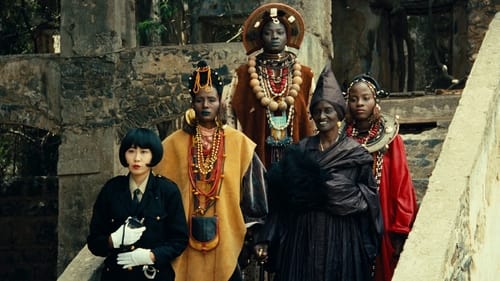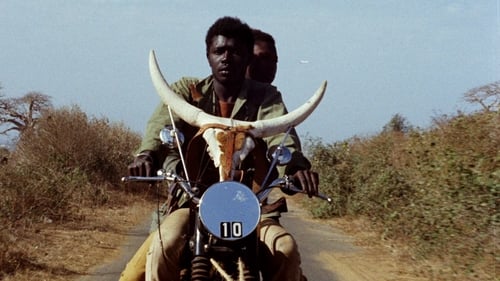Djibril Diop Mambéty
Рождение : 1945-01-01, Dakar, Senegal
Смерть : 1998-07-23
История
Djibril Diop Mambéty (January 1945 – July 23, 1998) was a Senegalese film director, actor, orator, composer and poet. Though he made only two feature films and five short films, they received international acclaim for their original and experimental cinematic technique and non-linear, unconventional narrative style. Born to a Muslim family near Dakar, Senegal's capital city, Mambéty was Wolof. He died in 1998 while being treated for lung cancer in a Paris hospital.

Self
Senegalese director Djibril Diop Mambéty, one of the greatest figures in all of African film, died in 1998. In this behind-the-scenes documentary, shot during the making of his final work, The Little Girl Who Sold the Sun / La petite vendeuse de soleil, Mambéty speaks with his technicians, prepares the actors, talks with his young star, and, in voiceover, shares his thoughts on cinema and life.Mambéty doesn't differ significantly from the stock "behind-the-scenes" documentaries that adorn most DVDs nowadays, except that Mambéty's films have scenes you actually want to be taken behind. Because of the kind of attention that gets paid to African cinema, there's an initial intrigue to Mambéty, but that interest is sustained by Mambéty's own lyrical insights into his aesthetics.

Writer
In Dakar, selling newspapers on the street is an occupation always occupied by boys.; one morning, Sili, a young beggar, challenges that exclusive rule.

Director
In Dakar, selling newspapers on the street is an occupation always occupied by boys.; one morning, Sili, a young beggar, challenges that exclusive rule.

Himself
Documentary about Djibril Diop Mambety.

Writer
A penniless, fast-thinking musician buys a lottery ticket which he glues to his back door, in hopes of eventually retrieving his instrument from his exasperating landlady. —but the ticket wins...

Director
A penniless, fast-thinking musician buys a lottery ticket which he glues to his back door, in hopes of eventually retrieving his instrument from his exasperating landlady. —but the ticket wins...

Co-Producer
A now-rich woman returns to her poor desert hometown to propose a deal to the populace: her fortune, in exchange for the death of the man who years earlier abandoned her and left her with his child.

The Judge
A now-rich woman returns to her poor desert hometown to propose a deal to the populace: her fortune, in exchange for the death of the man who years earlier abandoned her and left her with his child.

Writer
A now-rich woman returns to her poor desert hometown to propose a deal to the populace: her fortune, in exchange for the death of the man who years earlier abandoned her and left her with his child.

Director
A now-rich woman returns to her poor desert hometown to propose a deal to the populace: her fortune, in exchange for the death of the man who years earlier abandoned her and left her with his child.

In April and May 1991, Djibril Diop Mambéty shot his second—and final—feature, Hyenas, a free, lyrical adaptation of Friedrich Dürrenmatt’s play The Visit, which he had been dreaming of bringing to life for years. Rather than taking the making-of approach, Ninki Nanka, The Prince of Colobane used the filming of Mambéty’s movie, which he wrote, directed, and acted in, as a pretext to examine his character. Following him throughout the shoot and also paying visits to his family and childhood friends, Laurence Gavron set off on a quest to find the real Djibril—actor, author, filmmaker, brilliant poet, rogue and clairvoyant, charmer with a big heart—in order to expose the different facets of this generous, creative, and fiercely committed vagabond spirit.

Writer
Djibril Diop Mambéty followed and filmed the shooting of Yaaba, Idrissa Ouédraogo's second feature film. A documentary full of humorous anecdotes regarding the dangers of shooting in Burkina Faso.

Director
Djibril Diop Mambéty followed and filmed the shooting of Yaaba, Idrissa Ouédraogo's second feature film. A documentary full of humorous anecdotes regarding the dangers of shooting in Burkina Faso.

Writer
Пастух Моури, который ездит на мотоцикле, украшенном черепом коровы, и студентка Анта, встретились в столице Сенегала Дакаре. Отверженные и разочарованные Сенегалом и Африкой, они стремятся попасть в Париж и разрабатывают различные мошеннические схемы, чтобы заработать денег.

Director
Пастух Моури, который ездит на мотоцикле, украшенном черепом коровы, и студентка Анта, встретились в столице Сенегала Дакаре. Отверженные и разочарованные Сенегалом и Африкой, они стремятся попасть в Париж и разрабатывают различные мошеннические схемы, чтобы заработать денег.

Writer
Badou Boy, a cheeky young man, travels through the streets of Dakar on the city buses and experiences adventures.

Director
Badou Boy, a cheeky young man, travels through the streets of Dakar on the city buses and experiences adventures.

A fictional documentary that portrays the city of Dakar, Senegal, as we hear the conversation between a Senegalese man (the director, Djibril Diop Mambéty) and a French woman, Inge Hirschnitz. As we travel through the city in a picturesque horse drawn wagon, we chaotically rush into this and that popular neighborhood of the capital, discovering contrast after contrast: A small African community waiting at the Church's door, Muslims praying on the sidewalk, the Rococo architecture of the Government buildings, the modest stores of the craftsmen near the main market.

Screenplay
A fictional documentary that portrays the city of Dakar, Senegal, as we hear the conversation between a Senegalese man (the director, Djibril Diop Mambéty) and a French woman, Inge Hirschnitz. As we travel through the city in a picturesque horse drawn wagon, we chaotically rush into this and that popular neighborhood of the capital, discovering contrast after contrast: A small African community waiting at the Church's door, Muslims praying on the sidewalk, the Rococo architecture of the Government buildings, the modest stores of the craftsmen near the main market.

Director
A fictional documentary that portrays the city of Dakar, Senegal, as we hear the conversation between a Senegalese man (the director, Djibril Diop Mambéty) and a French woman, Inge Hirschnitz. As we travel through the city in a picturesque horse drawn wagon, we chaotically rush into this and that popular neighborhood of the capital, discovering contrast after contrast: A small African community waiting at the Church's door, Muslims praying on the sidewalk, the Rococo architecture of the Government buildings, the modest stores of the craftsmen near the main market.

Narrator
Narrated by Djibril Diop this film denounces the hanging of three African revolutionaries in Salisbury, South Africa.





